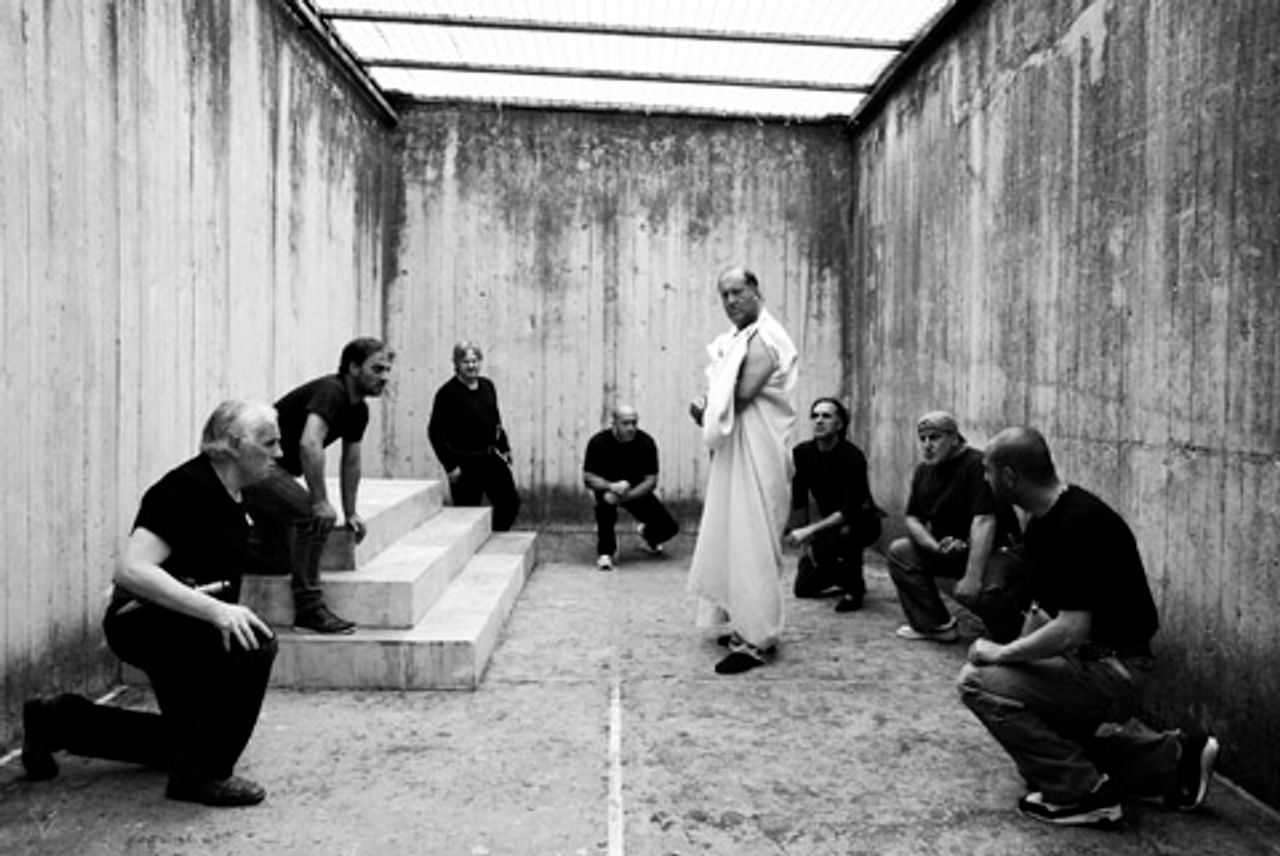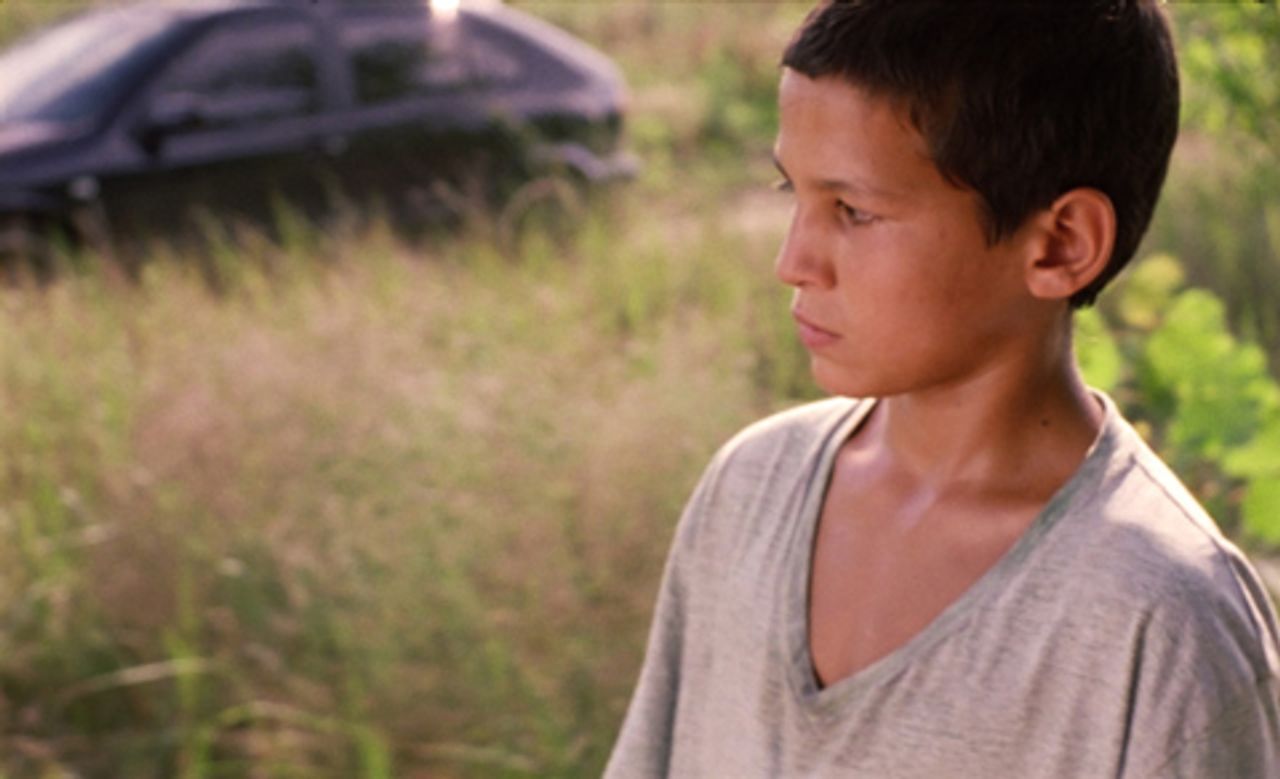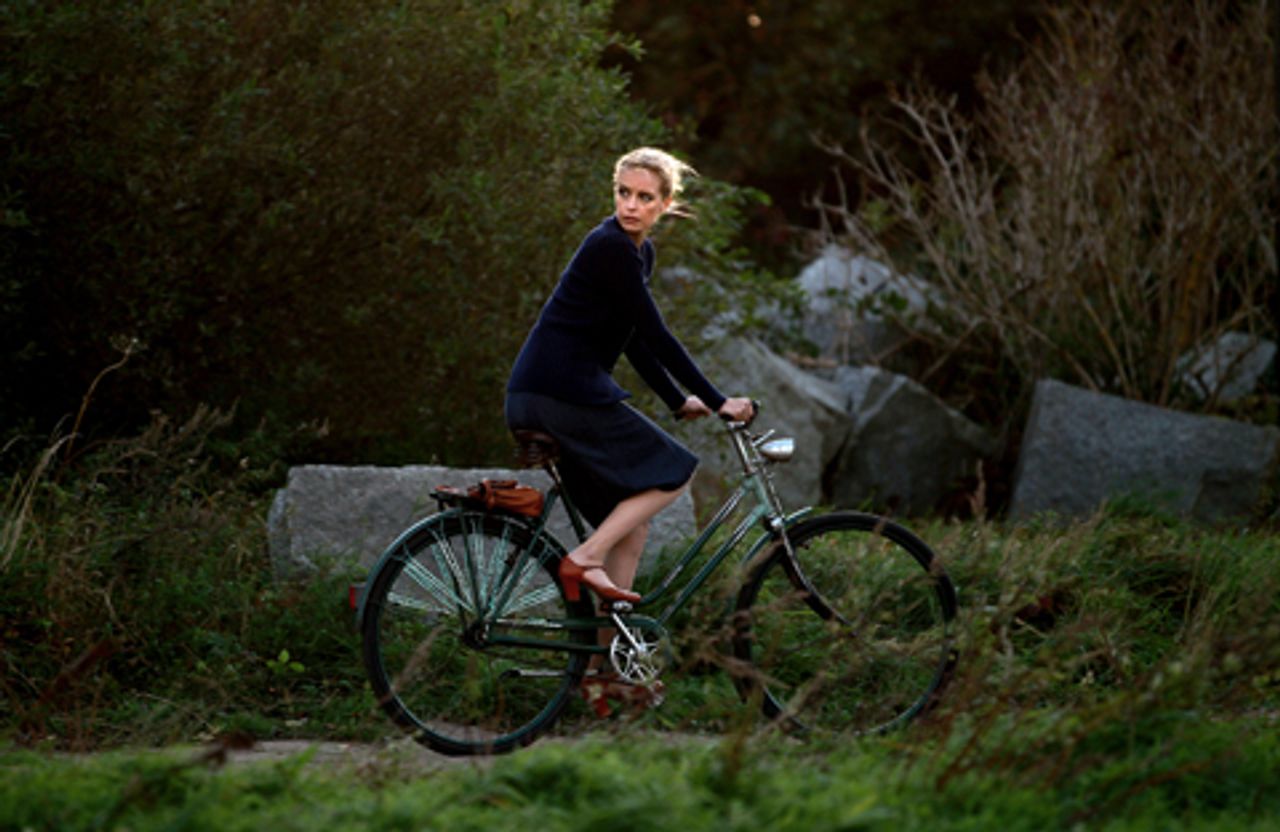This is the first of a series of articles on the recent Berlin film festival, the Berlinale, held February 9-19, 2012.
It is not often that this reviewer is in agreement with the decisions made at the end of the Berlin Film Festival, but this year the jury—headed by veteran British director Mike Leigh—awarded the festival’s principal prizes to a number of interesting and significant works.
The main prize of the jury, the Golden Bear, went to Caesar Must Die, by the Italian directing duo, Paolo and Vittorio Taviani. The Silver Bear was won by the feature film Just the Wind, by the young Hungarian director Bence Fliegauf, and the prize for best director went to the German director Christian Petzold for his film Barbara. Although dealing with very different subject matter, all three films (see below) provided intellectually and emotionally engaging portraits of their protagonists reacting to their respective, carefully drawn, social environments.
 Caesar Must Die
Caesar Must DieAt the same time, it would be misleading to conclude that the winning trio of films were representative of the festival selection as a whole. In his introduction to this year’s festival, director Dieter Kosslick stressed the political content of its programme which included: “a lot of films about revolutions and new dawns. There’s a focus on people protesting to get rid of old, stale regimes”.
In fact, some of the weakest, most problematic films on show at the festival were those dealing directly or indirectly with political events. Some of these works will be dealt with in a separate article.
A highlight of this year’s festival was undoubtedly the Retrospective section devoted to the work of the Soviet-German film company Mezhrabpom. Mezhrabpom produced over 400 films in the 1920s and 1930s before being closed down by Hitler in Germany and Stalin in the Soviet Union. A number of the Mezhrabpom films shown at the festival—including romantic comedies, documentaries, sci-fi fantasies and political satires—were a revelation, making clear the broad palette of filmmaking which flourished in the aftermath of the Russian Revolution. A number of these films and filmmakers will be the subject of subsequent articles.
Caesar Must Die
The Taviani brothers, Paolo, 80, and Vittorio, 82, first came to international attention with Padre Padrone back in 1977—a film firmly in the tradition of Italian realist cinema. For their latest project, the directorial team accepted an invitation to make a film version of Shakespeare’s Julius Caesar featuring a cast drawn from the inmates of the high security section of the Rebibbia prison on the outskirts of Rome.
At the start of Caesar Must Die, we witness auditions for the film. One by one, the prisoners state their names and places of birth. Subtitles reveal they have been incarcerated for long prison spells (some for life) for a variety of serious offences, including drug trafficking and murder. A number of them have been jailed for offences committed as members of the Mafia.
The Tavianis’ work begins and ends with brief scenes performed before an audience in the jail’s main auditorium, but most of the film features the inmates rehearsing together and struggling to learn their lines in the jail’s claustrophobic corridors and tiny cells (which house up to five prisoners). The scenes from Shakespeare that feature in the film ... the conspiratorial preparations for the elimination of the dictator, the murder of Caesar by a clique, including his closest ally, Brutus, are played with great passion and conviction by the inmates.
In his famous funeral ovation for Caesar, Mark Antony sarcastically refers to Brutus and the other conspirators in Shakespeare’s play as “honourable men”—a phrase which finds its echo in the gang-speak of today’s Italian Mafia—“men of honour”. The power of the performances in Caesar Must Die stems from the ease with which the inmates of Rebibbia can identify with the themes that feature in Julius Caesar written over four centuries ago—friendship and rivalry, power and the abuse of power, and above all—betrayal.
Although they were given the opportunity to adopt pseudonyms, none of the inmates choose to do so. They use the opportunity to proclaim their real names and also take responsibility for their crimes. Along with the film itself, the prize in Berlin is another acknowledgement of their very existence, but a moving performance in a film is not the same thing as remission of sentence. One of the prisoners declared that the liberation he felt playing his role in the film brought home to him with full force the fact that he was condemned to live out his entire life in a cell. The Taviani brothers made a courageous and rewarding choice for their latest film.
Just the Wind
Just the Wind (Czak a Szél) by Bence Fliegauf is a feature film based on the pogroms conducted against Hungarian Roma between 2008 and 2009. During that period Roma families were targeted by well organised death squads that hunted them down like animals. Six Roma were shot to death, including a five-year-old boy. Five others sustained serious injuries following a series of attacks carried out in nine Hungarian villages in which entire homes were burned down.
 Just the Wind
Just the WindIn Just the Wind Fliegauf carefully recreates the existence of a Roma family over the course of 24 hours while the pogroms are in full swing. In interviews, Fliegauf made clear he was concerned to avoid stereotypes in presenting the Roma community and there is nothing romantic in his depiction of their everyday life.
We watch the mother leaving the family’s ramshackle home early in the morning to start one of her two jobs, clearing rubbish from the side of the motorway. Her young daughter hurriedly prepares a meagre breakfast for her grandfather and then leaves for school. Before she leaves, she tries to wake her younger brother, still asleep in the single bed shared by the whole family. The young boy prefers to sleep longer and skip school.
Having completed her shift on the roadside, the mother travels to her second job, cleaning floors at her daughter’s school. There, the mother is subject to racist insults from her overseer, her daughter’s teacher. In addition to exploitation at work and racist taunts, the family lives in continual fear of the gunmen who have already claimed victims in their community. The most telling scenes are those featuring the young children wandering through the woods. A jeep cruises by slowly on the nearby road. The young boy quickly falls to his knees in the grass and pretends to tie his shoelaces, thereby making a smaller target. The jeep drives on.
In another disturbing scene, two policemen inspect the burnt-out ruins of a Roma house. The police captain deplores the murder of the Roma. He knew this family, he tells his fellow officer, they were hard-working and their murder sends the “wrong message”. The ones who deserve to die, he continues, are those who rob and steal. His gruesome statement certainly leaves open the possibility that Hungarian state forces were involved in the pogroms.
At the end of the film, the family make a fatal mistake and dismiss the rustling in the woods as they prepare to go to sleep as “just the wind”. Fliegauf has made a compassionate and compelling film detailing the privations of the Romany minority in Hungary.
There are also serious weaknesses in Fliegauf’s own understanding of racism, which account for the fact that the political authorities are not mentioned in his film. In his film notes, Fliegauf declares that “racism is nothing more than a fatal series of mistakes in reason, i.e. inanity”. This conception is false and serves to whitewash the policies of successive governments that have deliberately and repeatedly played the racist card in Hungary to further their own ends over the past two decades.
After a great deal of prevarication by the police and the Hungarian judiciary, four men were eventually arrested and are currently on trial in Budapest accused of carrying out the attacks between July 2008 and August 2009. Given the broad political consensus which encourages anti-Roma sentiment in Hungary, it remains uncertain that the truth behind the pogroms will ever emerge.
Christian Petzold’s Barbara
Christian Petzold (born 1960) is one of the most interesting German directors working today. In his previous films, Ghosts (2005), Yella (2007) and Jerichow (2008), Petzold paid considerable attention to presenting the largely oppressive social environment in which his protagonists function, and often fail. Barbara is his first film which takes place in the past, and in the former Stalinist German Democratic Republic (GDR, East Germany).
 Barbara
BarbaraThe main character, Barbara (Nina Hoss) is a doctor in disgrace with the East German state authorities because she has applied for an exit visa from the GDR. The date is 1980. As punishment, she has been transferred from Berlin to a small hospital in the countryside, where she is subject to the constant intrusions of the local Stasi (State Security) officer.
In the meantime, Barbara’s lover from West Berlin is preparing her flight. She is thoroughly disillusioned with the GDR, which she regards as an obstacle to her personal freedom. We are not informed of any political motives behind her decision. In the course of her work in the new hospital, she becomes increasingly attracted—against her will—to a conscientious young doctor, André (Ronald Zehrfeld).
Suspicious of all and sundry, Barbara is initially convinced that André is seeking her attentions in order to spy on behalf of his Stasi masters. In the event, there is a grain of truth in her suspicions. Following a past indiscretion on his part, the Stasi blackmailed André to function as a so-called “unofficial co-operator”. For his part, André has no interest on spying on his colleague and is prepared to risk his career in that regard.
An interesting dialogue develops between André and Barbara, who can only justify her decision to travel to the West on egoistical grounds. André, despite his persecution by the State Security, still feels an obligation towards the land which provided him with his professional training and what he identifies as the socialist ideals of the GDR.
Petzold works closely together with his actors—it is his fifth cinematic collaboration with Nina Hoss—and goes to considerable lengths in establishing an authentic atmosphere for his characters, in this case, the stifling climate of bureaucratic oppression and fear of denunciation that prevailed in East Germany in its final decade of existence.
